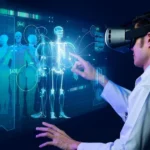Have you ever felt like your healthcare isn’t truly designed for you?
In traditional healthcare systems, treatments are often generalized, leaving you with a cookie-cutter solution that doesn’t consider your personal history, lifestyle, or genetic makeup.
But as healthcare becomes increasingly data-driven, more and more patients are seeking tailored care.
The good news?
With the advancements in concierge medicine, you can finally get the highly personalized treatment you deserve.
Concierge doctors, who provide personalized care through a membership model, are stepping up with data science-driven solutions—ranging from genetic profiles to real-time health metrics. This enables them to craft treatment plans tailored specifically to everyone, so at the end of the day, you get better health outcomes.
Curious to learn more?
Let’s dive into how data science is empowering concierge doctors to provide truly personalized healthcare and some of the current challenges in the field.
What is Concierge Medicine?
Concierge medicine is a healthcare model that provides personalized care to patients through a membership-based structure.
Unlike traditional healthcare, which often involves long wait times and rushed appointments, concierge medicine focuses on tailored, patient-centered care.
Some of the concierge medicine benefits include:
- Same-day appointments
- 24/7 communication
- Longer visits
In contrast, traditional medicine typically follows a standard, protocol-driven approach, where treatment plans are based on generalized guidelines rather than individual patient profiles.
Concierge care also takes into consideration factors such as genetics, lifestyle, and medical history to craft specific treatment plans that fit each patient’s needs. So, if you’re looking for more attentive care that goes beyond the limitations of traditional models, concierge medicine could be a good fit.

How Data Science Improves Concierge Medicine?
Data science is rapidly reshaping the healthcare sector. For example, big data analytics in healthcare is expected to grow at a CAGR of 16.7%, from $29.7 billion in 2023 to $134.9 billion in 2032.
Additionally, soon advanced technologies like AI and predictive models could help detect complex conditions like Alzheimer’s or Parkinson’s disease in their earliest stages.
This surge in data capabilities also opens new avenues for concierge medicine, allowing doctors to leverage real-time data, predictive models, and personalized health insights.
By integrating data science, concierge doctors can create more precise, patient-specific treatment plans, improving outcomes and making healthcare more proactive than ever before.
Data Collection and Integration
Concierge doctors can now collect a wide range of data on your genetics, lifestyle habits, and medical history. Lab results and imaging reports are also used to collect relevant information that helps create a comprehensive patient profile.
Additionally, wearable devices allow access to real-time health metrics, such as heart rate, sleep patterns, and physical activity. This data helps your doctor make any needed adjustments to your treatment plan. For example, if your concierge doctor is collecting data from your fitness tracker, they can adjust your exercise routine for optimal heart health.
Advanced Data Analytics for Treatment Customization
Data science in concierge medicine uses predictive models to forecast potential health risks. For instance, by analyzing your genetic data and family history, your concierge doctor can estimate the risk of developing diabetes or other chronic conditions.
Additionally, machine learning offers powerful algorithms that sift through vast amounts of patient data to identify patterns that may be invisible to the human eye. These insights enable doctors to intervene on time and create more precise treatments.
How Concierge Doctors Use Data to Tailor Treatments
The integration of data science into concierge medicine allows concierge doctors to craft treatments that not only address current issues but also prevent future health risks.
1. Precision Medicine in Practice
As data science leads to a better understanding of patients’ genetic makeup and how it affects their reaction to medications, doctors can now customize prescriptions for optimal outcomes.
How does this work?
Concierge doctors use pharmacogenomics (also known as genetic testing) to tailor medication types and dosages to each patient. This approach ensures that treatments are not only effective but also minimize side effects.
Example: If a patient’s genetic profile reveals they metabolize certain medications more slowly, their concierge doctor can adjust the dosage of a common medication. This can reduce side effects like nausea or drowsiness and improve the overall effectiveness of the treatment.
2. Lifestyle and Wellness Plans
In addition to medications, concierge doctors use data to create holistic wellness plans that include diet, exercise, and sleep. They can collect data from wearables or health apps (e.g., fitness trackers) to adjust these plans so they reflect the patient’s lifestyle and improve overall well-being.
Your concierge doctor can also create a tailored health plan aimed at extending longevity. This typically focuses on preventive care strategies, nutrition, and consistent monitoring of biomarkers to ensure optimal aging.
In addition to physical health, concierge doctors can monitor mental health metrics such as stress levels. These insights help in creating mental wellness strategies, like stress-relief exercises or mindfulness practices.
Example: A patient’s sleep patterns may reveal a lack of deep sleep. The concierge doctor can use this data to tweak their wellness plan, suggesting dietary changes, meditation, or adjusting physical activity levels to improve sleep quality.
3. Early Detection and Risk Mitigation
Data science enables concierge doctors to spot early warning signs of potential health risks through predictive models. These models, built on genetic data and family history, help your doctor craft proactive treatment plans aimed at preventing chronic illnesses, such as heart disease or cancer.
For patients who travel frequently, concierge doctors can also use data to assess health risks specific to certain regions. By analyzing epidemiological data and destination resources, your physician can provide tailored advice on vaccinations, medical supplies, or emergency protocols based on your destination and health status.
Example: A concierge doctor might use a patient’s genetic predisposition for cancer and their family medical history to develop a monitoring plan. This can include regular screenings, lifestyle adjustments, and preventive medications, which can reduce the risk of the disease developing in the first place.
4. Continuous Monitoring and Adjustments
Remote Patient Monitoring (RPM) through wearable devices and health apps provides real-time data that concierge doctors can monitor continuously. This allows them to make timely adjustments to your treatment plan so intervention can happen before issues escalate.
In addition, RPM helps reduce the need for frequent in-person visits, as doctors can track your progress remotely and ensure small changes don’t go unnoticed.
Example: For a patient with high blood pressure, heart rate and blood pressure data can signal to the doctor when adjustments to medication or lifestyle are needed. This allows for timely changes that prevent more serious complications from developing.
Challenges in Data-Driven Concierge Medicine
While data-driven concierge medicine offers some great benefits, it also comes with its own set of disadvantages that doctors and patients must navigate.
Here are the main challenges you should be aware of:
- Patient confidentiality: With the rise of digital health platforms, safeguarding sensitive patient data has never been more critical. Personal health information, genetic data, and real-time metrics from wearables all contain highly confidential information that requires robust protection. That’s why it’s crucial for concierge doctors to comply with HIPAA regulations and utilize secure EMR (Electronic Medical Records) systems. Having this sensitive data always secure also means you can avoid any potential breaches, security threats, hefty fines, and legal issues.
- The role of the doctor: While data science can guide treatment decisions, human judgment remains essential. Doctors must interpret the wealth of data available to make informed decisions, considering the broader context of the patient’s overall health and circumstances. Beyond numbers and algorithms, a doctor’s expertise is what helps create holistic and truly patient-centered treatment plans.
- Balance between technology and personal care: Though technology is a valuable tool, it cannot replace the empathy and trust built in a doctor-patient relationship. Data can help predict outcomes or adjust treatments, but personal interactions and a deep understanding of the patient’s unique needs are irreplaceable components of effective care.
Conclusion: Embrace Data-Driven Concierge Medicine
Data science has empowered concierge doctors to deliver customized treatments, improving patient outcomes and overall health. By leveraging real-time data, predictive analytics, and machine learning, concierge medicine offers a proactive, tailored approach to healthcare that goes beyond traditional methods.
As data science continues to advance, we can expect even more innovative and precise approaches to personalized healthcare.
Meanwhile, if you’re looking for more individualized, preventive care, concierge medicine could be the solution you’re looking for.



